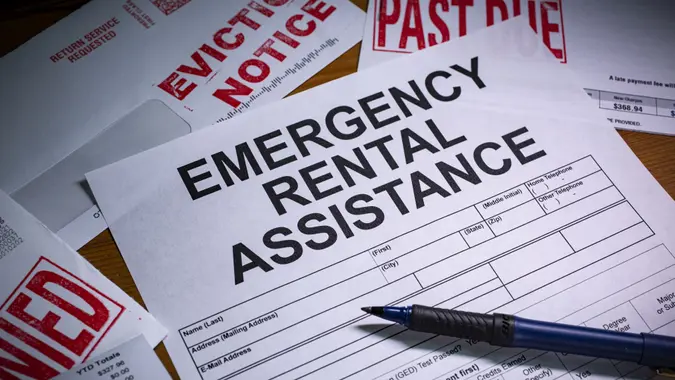At Risk of Eviction? Here Are Some Steps You Can Take

Commitment to Our Readers
GOBankingRates' editorial team is committed to bringing you unbiased reviews and information. We use data-driven methodologies to evaluate financial products and services - our reviews and ratings are not influenced by advertisers. You can read more about our editorial guidelines and our products and services review methodology.

20 Years
Helping You Live Richer

Reviewed
by Experts

Trusted by
Millions of Readers
Evictions are up in many parts of the U.S. as rents rise and eviction moratoriums have lifted. The Eviction Lab, a project out of Princeton University, reported 9,300 evictions in the first week of January in the nine states and 32 cities it currently tracks. In New York City, the Eviction Tracking System noted 4,400 evictions in January so far.
If you’re facing eviction due to unpaid rent bills, take heart. Depending on your state, you may still be protected from eviction. There are places to turn for help.
Apply for Federal Rent Assistance
If you don’t live in a state you are protected from certain forms of eviction, you may qualify for emergency rental assistance at the local, state, regional or federal level. The federal emergency rental assistance (ERA) program may also provide help with internet costs, electricity and other utilities. By having these costs covered through emergency assistance, you may be able to pay your rent.
Assistance might also cover rent payments and late fees. In some cases, if you are forced to move, you may be able to get help with security deposits, screening and application fees, according to ConsumerFinance.org.
Consider Alternate Options To Generate Income for Rent
With a tight labor market and many companies looking for help, you may be able to earn some extra cash to make ends meet. Consider picking up part-time gig work with a food delivery service, pet-sitting service or personal shopping service. You can also look into options with a flexible schedule you can do from home, such as working as a virtual assistant or transcriptionist. Many remote jobs have flexible hours so you can fit them in alongside your full-time job.
“It’s easier than ever… to make money on various apps, plus we are in a tight labor market,” Gary Grewal, certified financial planner and contributor at FinancialFives.com, pointed out.
Negotiate With Your Landlord
Landlords don’t want to face the eviction process any more than their tenants do. But the fact is, not every landlord is flush with funds — and if you aren’t paying rent, they might not be able to meet their mortgage payments to keep the building you’re living in (or pay their utility bills to keep your lights on).
It pays to try to negotiate with your landlord to find an arrangement that can keep you in your home while giving your landlord the income they need, as well. Howard Dvorkin, CPA, advised, “Contact your landlord to discuss a deferred payment plan. This is worth a shot as most landlords do not want to pay a fee to file a lawsuit, go to court… and go through the expense and hassle of finding a new tenant.”
However, if your landlord decides to pursue the eviction with a court case, make sure you are protected.
“If you end up in court, you need a lawyer. Find one who specializes in evictions. If you’re worried about the cost, just know this: You’re likely to pay more and suffer more without one,” Dvorkin said.
More From GOBankingRates
- The Best $20 You Can Spend at Dollar Tree, According to Superfans
- 10 Cars That Outlast the Average Vehicle
- This is One of the Best Ways to Boost Your Retirement Savings in 2024
- 7 Things You'll Be Happy You Downgraded in Retirement
 Written by
Written by  Edited by
Edited by 

























